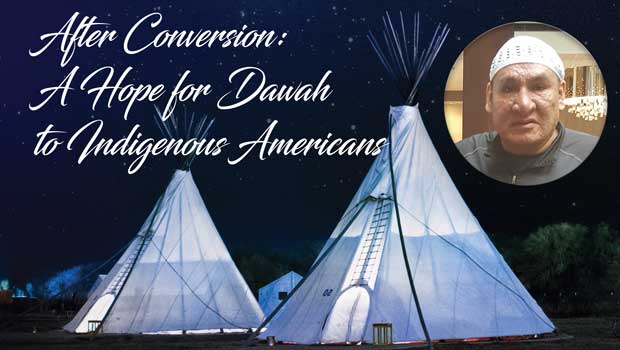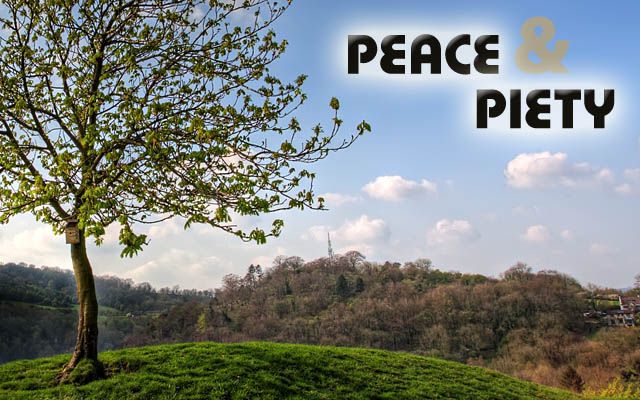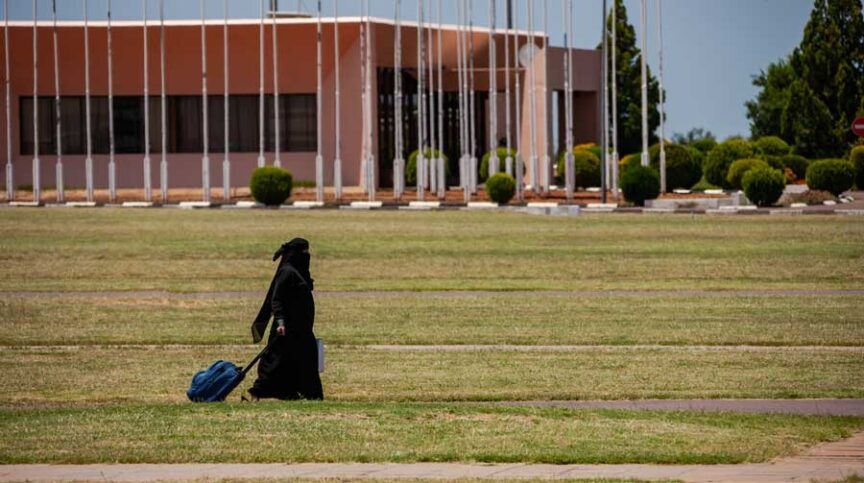I am a Lakota. When someone doesn’t understand that, I say I am a Sioux Indian. Everyone understands that expression. We can be referred to as Sioux Indians, Sioux American Indians, or Indians. When Columbus came over to the Western hemisphere, he thought that he had landed in India, so he started calling the people Indians. Many Americans don’t know that the United States government has a Bureau of Indian Affairs. We try to educate people about who we are and the language that we speak, and that most of us prefer not being called Indians.
South Dakota is where the majority of the Lakota Sioux oyate (nation) live. The Lakota word “oyate” is like the word “ummah” in Arabic. We have about seven or eight tribes in South Dakota, one in Nebraska, one or two in Minnesota, three in North Dakota, and one in Montana. There are lot of us. Out of all the tribes in America, we are the third largest behind the Navaho. I currently live in Rapid City, South Dakota. Rapid City is called the heart of the Black Hills. A lot of people who are familiar with our history know that this area is like Sacred Ground to us. During the winter time, our tribes migrated here to the Black Hills for winter camp. This is how we survived during the harsh winters. In the movie, Dances with Wolves, there are scenes at the end of the movie where the Sioux were migrating during the winter to the Black Hills. Historically, the Sioux stayed in the Black Hills for about three months before moving back out to the Plains. I am a member of the Cheyenne River Sioux Tribe. I lived on the reservation in South Dakota before moving here. The Cheyenne River Indian Reservation is connected to the Standing Rock Indian Reservation in North Dakota. We are only separated by a river. I lived in Rapid City from 2014-2015 before moving back to the reservation.
When non-Indians ask about reservation life, they wonder why we are so attached to the reservation. When you leave the reservation, which is home, and then come back to the reservation, you get a sense of security. We have our own government and we have our own laws. You feel completely different when you are living there. On the down side, there is a lot of unemployment, a lot of poverty, but it is home. We have been here for a very long time. Some non-Natives might comment, “Why do you want to go back there. There’s nothing for you to go back for.” For me, returning to the reservation is a source of security and strength.
Every reservation is considered a sovereign nation that has its own tribal government. For example, the state of South Dakota does not have jurisdiction within the Cheyenne River Indian Reservation boundaries. We have our own law enforcement. We have our own authority figures there. Our tribe is a federally recognized tribe.
My Conversion to Islam
I converted to Islam on September 21, 2001. I did some studies about the religion for several months prior to that. Islam connected me to my Creator. I had been a Christian, but I also practiced tradional Lakota spirituality. I was never comfortable with the way religion was being taught. You would have to have a sponsor to communicate with your Creator. I wanted to have a direct connection with God, our Creator, rather go through a preacher or someone else. I was participating in Lakota spirituality and sweat lodges and other things. It came to the point that I began to question why I have to go through these things. Why couldn’t I just communicate with God directly? I started to think that there should be no need for an intercessor, a third party. After learning about tawheed, I felt like this was exactly what I was looking for. In Lakota, we say “tunkasirra,” which is like tawheed. An African American brother who had converted to Islam years before I converted used to say to me, “You need to convert to Islam.” The brother would give me dawah (Invitation to Islam) whenever we saw each other. He spoke to me about Islam in a way that was attractive to me. I was also attracted to his manners and character. He would talk to me about how Islam connected you directly to Allah. The brother explained that some people think that Muslims pray to a god called Allah, but don’t understand that Allah is the one true God and that when Muslims say Allah, they are referring to the one true Creator. Arabic-speaking Christians call God by His name in Arabic — Allah. A lot of people don’t know that before the revelation of the Quran to Prophet Muhammad (peace be upon him), there were many Christians who believed in only one, indivisible God. The Muslim brother explained to me that religion is for Allah, it is His deen (prescribed way of life for mankind) and we, as human beings, can’t change the deen.
I asked the Muslim brother if Islam had any other books other than the Quran. He shared with me a book of hadith (sayings and actions of Prophet Muhammad, peace be upon him). I knew of only one other Native Muslim when I converted to Islam. He was of mixed blood, Native American and African American. Shortly after I became Muslim, I heard about two Native American Muslim groups. I was surprised to hear that these groups existed. I remember that one group was in Cincinnati or Cleveland, somewhere in Ohio. The other one was in California. I contacted both groups, but the I never heard back from the group in Ohio. I did get a response after a couple of weeks from a brother from the California group. His organization was called Native American and Spanish-Speaking Muslims. The brother who wrote me back said that he converted to Islam sometime in the 1950s. His name was Benjamin Perez. He was half Native American and half Mexican Indian. I think he was a Yaqui Indian.
Benjamin Perez was associated with a lot of Native Muslims in the southwest United States and in Mexico. He told me about several Muslims in southern California and in the Bay area. I was excited to hear about them. I had begun to wonder if I was the only Native American to have converted to Islam. Learning about other Native Muslims gave me hope. Benjamin and I would have telephone conversations about Islam. He used to send me Qurans and other materials about Islam. I found that many of the materials that Benjamin sent me were good to share with non-Muslims because the information provided basic understanding about Islam and Muslims. I lost track of Benjamin for about a year. In December 2007 or 2008, I was searching for him online and found his obituary. I was really saddened to learn that he had passed. I looked to him as a mentor. Because of Benjamin, I wanted to form a Native American dawah organization. Since then, I have met a number of Native Muslims like Brother Hasan Groomes in North Carolina. He has been Muslim for quite a while and is very knowledgeable about Islam and Native American history. He is very active in the Turtle Island Muslims Facebook group. There are a lot of Muslims in that group.
Overcoming Stereotypes
The members of my tribe did not question me about the reason I had become Muslim. They had heard about my being Muslim years before I went back home to the reservation. I would sometimes see some of the guys from home in the city and they would give me salaams. Some of them had questions about Islam that I would answer for them. I talked to them about the similarities between Islam and Lakota spirituality. They are very similar except for the clarity found in Islam about tawheed and shirk (associating partners with Allah). I had to explain the concept of tawheed to them. Lakota spirituality is like Islam in the sense that it is a total way of life. I was talking to a brother from Pakistan about the Lakota way of life and I gave him something to read. He responded, “This (Lakota spirituality) is like Islam, a total system of life.” Yet, there is a lot of negativity about Lakota spirituality in the same way that some people talk about Islam without knowing anything about the subject. Being Native American in this society, I unfortunately hear many negative stereotypes about Muslims and Native Americans. Native Americans get stereotyped as freeloaders and alcoholics. The same sort of people will refer to Muslims as terrorists. When I hear people put down Natives, it is difficult for me. And when I converted to Islam in 2001, I wasn’t sure that I wanted to become Muslim although I had already embraced it in my heart. There were so many negative comments being made in the media about Islam and Muslims at that time.
I went to Jummah on September 21, 2001 and one of the topics that the Imam talked about that stuck with me was the importance of dealing with our inner selves. After hearing that khutbah (sermon), I decided to take my shahadah regardless of the negative publicity that Muslims were receiving in the media. After Jummah, I told the Imam that I wanted to take my shahadah. He asked me whether I was sure about my decision. He told me that he knew that I had knowledge about the basic requirements of Islam. He felt that I was ready to convert because of my basic understanding of the deen. I hesitated for a few minutes before taking my shahadah, thinking about all that Muslims were going through after the events of 9/11. But, after I thought about it for a few minutes, I thought to myself that Native Americans have been going through that and more since 1492. I had sympathy for the Muslims because of all the negative backlash. It’s sad that conditions for Muslims in America are still the same from 2001 until today. Racism and hatred against Muslims is just as bad or worse now as it was then. I am equipped to deal with discrimination against Muslims as a Lakota Native American Muslim. Allah knows best if it is going to continue to be this way. Muslims must maintain solidarity and continue to fight against evil, no matter what our culture, race, or nationality may be.
Dawah to the Lakota People
I have never seen or heard of Muslims giving dawah to the Lakota people on the reservations. One of the first things established on reservations were churches, not just one or two churches, but many. I was baptized in the Episcopal Church. All my relatives on my father’s side of the family are Episcopalians. I was a fifth generation Episcopalian. My great-grandfather and my great-great-grandfather were in the Episcopal Church. When I was growing up, I was active in Christmas and Easter celebrations and going to Sunday school and Sunday service every week. There are Mormon churches on the reservations and Christian churches of many denominations.
Lakota and other Native people were, for the most part, historically forced to become Christians. Boarding Schools for Native Americans were a sad part of Indigenous and American history. All types of abuse took place in these schools. Some of my ancestors told us stories about these schools. One example is the Carlyle Indian School in Pennsylvania. Native American children were forcibly removed from their families, tribes, and homes and sent to schools like the Carlyle Indian School where they suffered all kinds of physical, psychological, and sexual abuse. The children were punished if they were caught speaking their tribal language, using their tribal names, or practicing their traditional religion. In the Lakota tradition, boys have long hair which is considered sacred. At these schools, their hair was cut off, and they were forced to dress like White children dressed. Large numbers of these kids died or were mentally scarred for life. There is a lot of sadness resulting from being taken from your home. Carlyle is where Jim Thorpe went to school. (Jim Thorpe was an extraordinary athlete and is considered one of the most versatile athletes of the modern era. He was the first Native American to win an Olympic gold medal for the U.S., in 1912.)
The only barriers that I see that would keep Muslims from being effective in giving dawah on the reservations is a lack of understanding of each other’s culture. A few years ago, I took my wife to a pow wow on my reservation. She was standing in line wearing hijab and wearing a long dress like an abaya. All of a sudden, one of my co-workers said to me, “We are about to be blown up!” I asked him why he said that. He said, “There is an Arab woman standing there.” I looked around to see who he was talking about. I told him that the woman was not an Arab but a Native and that she was my wife. When I was living in Sioux Falls, we had a national pow wow that lasted for two weeks. One of my family members told me that a non-Native man offered to volunteer to help. He was told that they didn’t want any help from a terrorist. The man was not even a Muslim, but someone from a different culture who was presumed to be Muslim. So, it would be best for Muslims giving dawah on the reservation to be accompanied by someone from that reservation or at least someone with knowledge of the culture of the people there.




